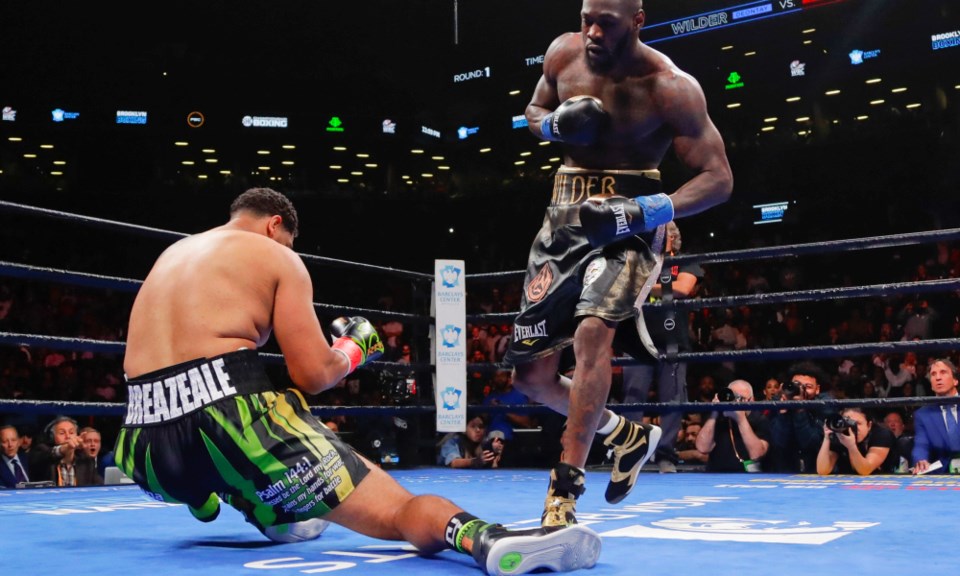Well, at least World Boxing Council heavyweight champion Deontay Wilder is honest — brutally honest, in fact.
In an interview on TSN on May 15, he stated: “This is the only sport where you can kill a man and get paid for it at the same time. … It’s legal.”
If he had stopped there, that would have been bad enough, but he went on to say: “I am still trying to get me a body on my record,” which clearly takes him from being a candid observer of and participant in a brutal activity to being a man hoping to commit murder.
According to a list available on Wikipedia, there have been 21 boxing deaths in the 21st century (up to Nov. 5, 2018), including two Canadians, both in Canada in 2017. In fact, there are more deaths than the list shows; in researching this column, I came across two deaths in Australia in 2015 that were not included, so there might be more.
On top of that are the deaths from the newly emerged and equally nasty mixed martial arts. A Wikipedia article states: “There have been seven recorded deaths resulting from sanctioned contests and nine from unregulated bouts” between 2001, when MMA was sanctioned in New Jersey and Nevada, and April 2019 — so 16 in all. Altogether, then, about two deaths a year across boxing and MMA.
But boxing also causes significant brain injuries that do not result in death. According to a website about health-research funding maintained by the National Health Council in the U.S., 90 per cent of boxers will experience at least one brain injury during their career, 15 to 40 per cent of ex-boxers at any given time have been found to have symptoms of chronic brain injury, 17 per cent of retired professional boxers exhibit chronic traumatic brain-injury symptoms and as many as 20 per cent of professional boxers develop neuropsychiatric symptoms.
Additionally, a study by researchers at the University of Toronto published in 2014 in the American Journal of Sports Medicine found about one-third of MMA bouts led to “match-ending head trauma.”
We have to remember that, unlike sporting or other activities in which people are injured or killed unintentionally, boxing’s “basic intent is to produce bodily harm by specifically targeting the head,” as the World Medical Association’s 1983 Statement on Boxing puts it. The statement, reconfirmed in 2005 and 2017, calls for a ban on boxing, a call taken up by many national medical associations, including the Canadian Medical Association, which reconfirmed its opinion in 2001.
We should be clear: Boxing and MMA are actually aggravated assault, and can on occasion become manslaughter. So why do we allow this brutal activity — I won’t call it a sport, it is no more a sport than were the Roman gladiatorial fights — to continue?
First, let’s not blame the victims. As Simon Barnes, former chief sports writer at the Times of London, put it in the Spectator in April 2016: “Across history, boxers have been expendable. It’s always been easy to sell the spectacle of two fine athletes inflicting potentially lethal damage on each other. It’s the people who pay and the people who profit who must carry the responsibility for what happens to boxers.”
Troublingly, there is a very disturbed bunch of people out there who glorify violence and take pleasure in watching two people try to beat each other unconscious, with perhaps the added thrill of seeing one of them batter the other to death. They are no better than the Roman mob baying for blood in the arenas.
Equally troubling are the media companies that broadcast this disgusting spectacle, and the companies that sponsor it either directly or by buying advertising. But appeals to stop this sickening activity have fallen on deaf ears for years. Perhaps it is time to try a couple of new approaches.
First, we should insist that our legislatures pass laws to make it clear that there are no exceptions to the rule of law — aggravated assault is aggravated assault, while intending to “get me a body” is intention to commit murder. Second, we should learn from other campaigns against companies that behave badly and institute a boycott of all companies that support boxing and MMA.
Dr. Trevor Hancock is a retired professor and senior scholar at the University of Victoria’s School of Public Health and Social Policy.



